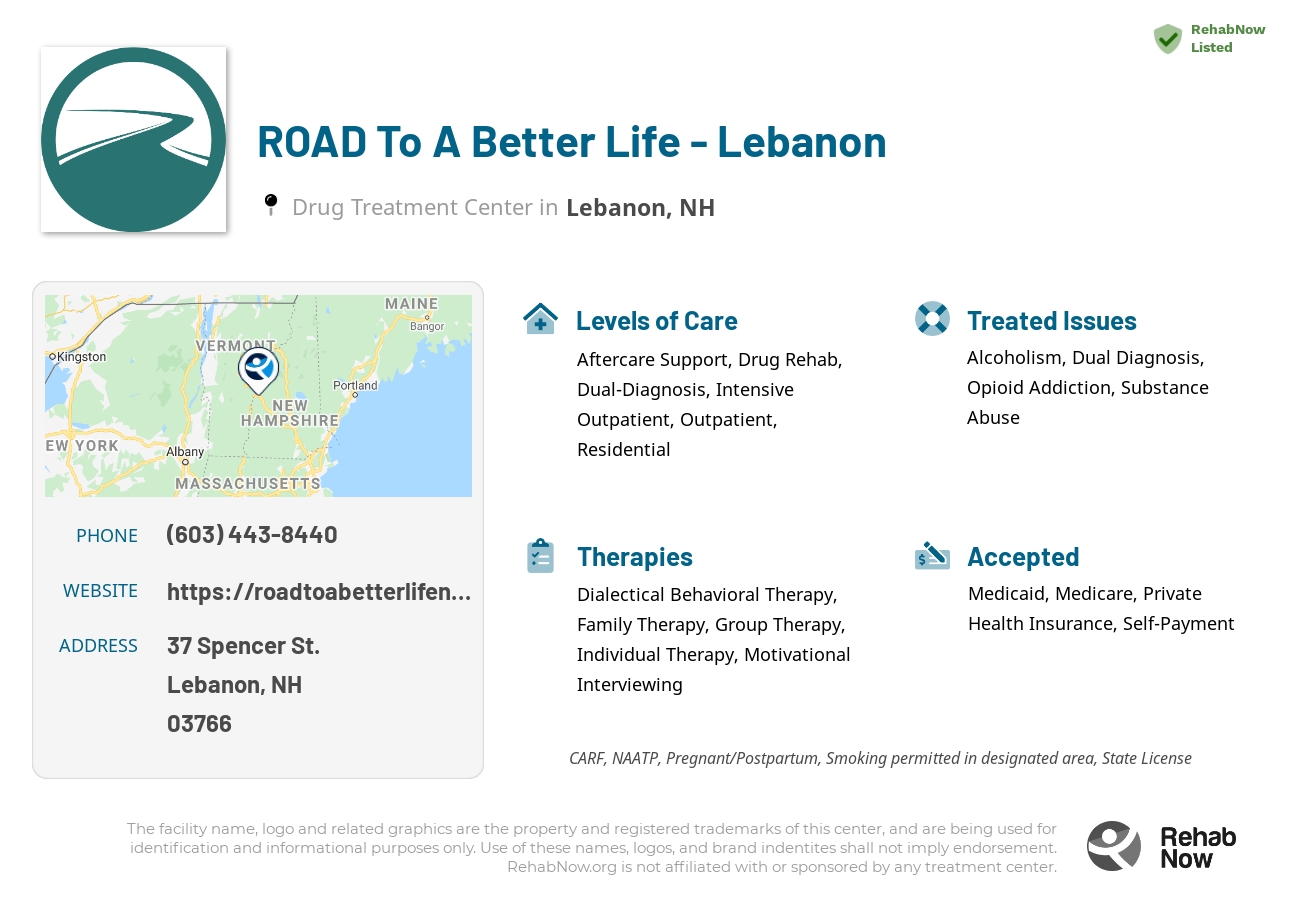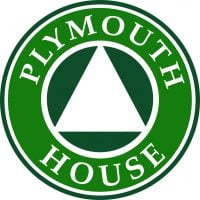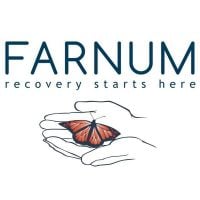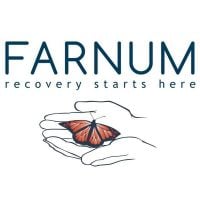ROAD To A Better Life - Lebanon
Drug Rehab Center in Lebanon, New Hampshire
ROAD To A Better Life - Lebanon is an addiction treatment center in New Hampshire that provides comprehensive care for individuals suffering from drug and alcohol addiction, including evidence-based treatment and additional therapeutic solutions, as well as aftercare and recovery support services.
Multiple patients have reported ROAD To A Better Life - Lebanon as permanently closed.
Research other rehabs in Lebanon, New Hampshire, or get help finding an open facility.
About ROAD To A Better Life - Lebanon in New Hampshire
ROAD To A Better Life - Lebanon is an addiction treatment center located in Lebanon, New Hampshire. They offer comprehensive care for individuals suffering from drug and alcohol addiction, as well as co-occurring mental health disorders. In addition to providing traditional evidence-based treatment that includes medication, counseling, and group therapy, they also offer additional therapeutic solutions such as task-based intervention and spiritual guidance. They also provide aftercare and recovery support services to ensure their patients stay on the right track towards a life of sobriety.
ROAD To A Better Life - Lebanon provides a complete range of services to support those suffering from addiction and substance abuse, including detoxification, residential rehabilitation, and outpatient services. Their personalized approach to treatment also includes gender-specific and family therapy, as well as community-based services such as vocational rehabilitation and legal assistance. With their trained and experienced staff, ROAD To A Better Life - Lebanon ensures that all patients receive the highest quality of care and support possible.
ROAD To A Better Life - Lebanon proudly holds the accreditation of the Joint Commission, and is a member of the American Society of Addiction Medicine and the New Hampshire Association of Addiction Services. In addition, the facility has received awards for their commitment and excellence when providing drug and alcohol treatment services. Through their innovative and compassionate approach, ROAD To A Better Life - Lebanon has been instrumental in helping countless individuals in their journey of long-term sobriety, reclaiming their lives and finding hope in recovery.
Genders
Ages
Modality
Additional
Conditions and Issues Treated
A combination of treatments is often needed to treat drug abuse. Some addictions can be treated with counseling and support groups. In other cases, drug abuse can lead to a medical problem and require medical treatment. Treatment for drug addiction typically combines counseling and psychotherapy with medication and behavioral therapies.
A combination of treatments is often needed to treat drug abuse issues effectively. In the case of drug abuse, there is no easy answer or one-size-fits-all cure.
Opioid addiction has become a significant health problem in the United States. In 2015, there were 91 opioid overdose-related deaths per day, with a substantial increase in mortality rate in 2014.
When opioid addiction has reached a point where a person’s life becomes unmanageable, treatment options are available to help them get sober. Treatment that includes medical care with medications and counseling can help a user transition into sobriety.
When someone in struggles with both addiction and mental or emotional illness, this is considered a dual diagnosis. Dual diagnosis treatment can include therapy for these issues to happen simultaneously, which will allow either of them to be treated effectively.
Sometimes people who have suffered from addiction disorder also suffer from co-occurring disorders such as depression, anxiety, bipolar disorder, etc., making them “dual diagnoses.” Dual diagnoses require specialized treatment programs where drug and alcohol addiction are addressed along with psychiatric illnesses. Some rehabilitation facilities provide patients suffering from cooccurrences a program with highly integrated services and a clean environment with few distractions to help them succeed.
Levels of Care Offered
This center offers a variety of custom treatment tailored to individual recovery. Currently available are Aftercare Support, Drug Rehab, Dual-Diagnosis, Intensive Outpatient, Outpatient, Residential, with additional therapies available as listed below.
The Intensive Outpatient Program offered by ROAD To A Better Life - Lebanon is designed for those who need intensive care but would rather get it in the comfort of their own home. The treatment programs vary in duration and intensity and can be tailored to suit the patient’s needs. The program includes regular visits to the facility, though the overnight stay is not needed. IOP is suitable for patients who have been treated in residential treatment programs and are in the transition phase. It helps the patient live at home and discharge some work or school responsibilities even while undergoing treatment. The patients gradually get back to their routine life with the support of a friend or family member.
Outpatient treatment is often used for drug addicts in drug rehab. Outpatient treatment consists of counseling and therapy sessions. This form of treatment is also called ‘day-treatment’. The outpatient treatment process begins with the addict’s initial detox period, lasting about ten days.
Outpatient treatment is used for those who are at moderate risk for ‘slipping back’ into the addiction, for those who:
- Are not currently experiencing any side effects from withdrawal and can handle social pressure
- Can handle stressors that might trigger relapse
- Have a stable living environment or have moved out of their previous environment, which was not conducive to being sober
- Have a support system that allows them to go to a facility a few times a week while still keeping their current responsibilities
- Have no legal obligations, being either on parole or probation, that require them to seek treatment at a mandatory facility
- Are not currently experiencing any side effects from withdrawal and can handle social pressure
- Have a stable living environment or have moved out of their previous environment, which was not conducive to being sober
Residential treatment programs are those that offer housing and meals in addition to substance abuse treatment. Rehab facilities that offer residential treatment allow patients to focus solely on recovery, in an environment totally separate from their lives. Some rehab centers specialize in short-term residential treatment (a few days to a week or two), while others solely provide treatment on a long-term basis (several weeks to months). Some offer both, and tailor treatment to the patient’s individual requirements.
Completing a drug or alcohol rehab program is only the first step. Then comes aftercare support. These services include sober living accommodations, career counseling, and AA/NA programs for those struggling with sobriety or who want help maintaining it after initial rehab at an addiction facility.
They can last up to a year or more depending on what’s needed most urgently after the earlier stages are completed.
Therapies & Programs
Because no single treatment is effective for all addicts, the goal of treatment and therapy should be to figure out what works best for each individual. Tolerance and withdrawal levels differ from person to person, affecting the treatment intensity required. Addiction treatment should aim to help addicts develop healthy coping mechanisms for dealing with their addiction and its underlying causes.
Family therapy is beneficial for people who are in addiction treatment services because it offers addicts the opportunity to work with their family members to better understand what led them to make choices that contributed to their addiction.
This type of therapy helps family members reach a deeper understanding of how they can best support their loved one during recovery. It also helps the addict better understand their own motivations and triggers that led them to turn to substance abuse.
Family therapy can help addicts in the following ways:
- Assists family members in processing difficult feelings so they don’t blame or resent recovering addicts
- Assists family members in understanding how addiction has impacted the addict and everyone who is involved with them
- Allows the addict to take responsibility for their actions, while encouraging improved communication skills
- Helps family members understand how to best support an individual in recovery so addicts don’t relapse again.
Group therapy can help build a stronger support system and give addicts in Lebanon, NH insight into their addiction that they gain through shared conversations. Group therapy occurs in a controlled group environment, exclusive of one on one meetings. This makes it safer for patients to feel comfortable sharing the struggles they’re going through and gaining perspective.
Dialectical Behavior Therapy (DBT) is a cognitive-behavioral therapy that helps patients understand the relationship between their thoughts, feelings, and behaviors. It is beneficial for those whose addictions and behaviors stem from severe mental health issues. The term “Dialectic” means the integration of opposites. In substance abuse, DBT refers to accepting the patient’s addiction and working to change their thoughts and behavior. It improves life skills such as controlling intense emotions without reacting impulsively, resolving interpersonal conflicts effectively, and promoting awareness about self and others.
Cognitive-behavioral therapy is a technique that is used to help people with addiction. Specifically, it is a way of identifying thoughts and behaviors that cause the addiction. It is typically used in an individual counseling session.
The content explains cognitive behavioral therapy and how it works to address some behaviors that may be leading to unintended consequences in their life, as well as its benefits for those seeking sobriety.
It works by helping people to talk through their issues and addressing the thoughts that cause said behaviors. It is an excellent way of learning about oneself and one’s perception of the world.
Payment Options Accepted
For specific insurance or payment methods please contact us.
Is your insurance accepted?
Ask an expert, call (888) 674-0062
ROAD To A Better Life Associated Centers
Discover treatment facilities under the same provider.
- ROAD To A Better Life - Merrimack in Merrimack, NH
- ROAD To A Better Life - Concord in Concord, NH
- ROAD To A Better Life - Somersworth in Somersworth, NH
- ROAD To A Better Life - Wolfeboro in Wolfeboro, NH
- ROAD To A Better Life - North Conway in North Conway, NH
Learn More About ROAD To A Better Life Centers
Additional Details
Specifics, location, and helpful extra information.
Lebanon, New Hampshire 3766 Phone Number(603) 443-8440 Meta DetailsUpdated November 25, 2023
Staff Verified
ROAD To A Better Life - Lebanon Patient Reviews
There are no reviews yet. Be the first one to write one.
Lebanon, New Hampshire Addiction Information
Opioids such as fentanyl, heroin, and prescription opioids form the largest drug threat in New Hampshire. More than 80% of all New Hampshire treatment centers admissions were related to one or more of these three drugs. Opioids such as fentanyl, heroin, and prescription opioids form the largest drug threat in New Hampshire. Since 2002, rates of alcohol dependency have also been among the highest in the country. In 2015, almost 15% of the residents were admitted to treatment centers for alcohol abuse.
Almost 8% of residents in Lebanon, New Hampshire are abusing alcohol or suffering from a form of drug addiction. Drugs such as marijuana, heroin, opioids, cocaine, or methamphetamines are common in Lebanon. 18% of children in Lebanon live with at least one parent who is a binge drinker. 38% of homicides in Lebanon were related to the use of drugs. Drug rehab facilities and 12-step programs are available in Lebanon.
Treatment in Nearby Cities
- Hooksett, NH (54.7 mi.)
- Derry, NH (70.3 mi.)
- Conway, NH (60.8 mi.)
- Bethlehem, NH (52.0 mi.)
- Franklin, NH (33.1 mi.)
Centers near ROAD To A Better Life - Lebanon
The facility name, logo and brand are the property and registered trademarks of ROAD To A Better Life - Lebanon, and are being used for identification and informational purposes only. Use of these names, logos and brands shall not imply endorsement. RehabNow.org is not affiliated with or sponsored by ROAD To A Better Life - Lebanon.










